人教版五年级英语下册各单元知识点总结-五年级英语下册知识点
小学英语人教版PEP五年级下册1-6单元知识点总结

Unit1 My day一、基本句型1.询问什么时候做某事:- When do you ……?你什么时候……?- I usually…at …. 我通常在…(点钟)…。
例:-When do you eat breakfast?-I eat breakfast at 7:00.2.What do you do on the weekend?你周末做什么?- I +频率副词+周末活动+时间。
或Sometimes I+周末活动例句:I sometimes go shopping with my mum on the weekend.(周末我时候和妈妈一起去购物)二、知识点:1.频率副词:always(总是,一直)>usually(通常)>often(经常)>sometimes(有时)2.只有Sometimes可以放在句首。
(Sometimes I cook dinner.)3.On the weekend 在周末on Saturdays 在周六on Sundays在周日(别忘加s)Unit2 My favourite season1.-Which season do you like best? (你最喜欢哪个季节?)Why?(为什么)-I like +季节+ best.(I like spring∕summer∕fall∕winter best) Because ___________.(因为)或:-What‘s your favourite season? -My favourite season is spring∕summer∕fall∕winter.2.-Why do you like winter best?(你为什么最喜欢冬天?) -Because______.二、知识点:1.leaf(树叶):复数leaves2.W,W真神奇,问出许多大问题。
what,what,问“什么”,when,when,问“时间”,where,where,问“哪里”,which,which,“哪一个”,why,why,“为什么”.Unit3 My school calendar补充:1.Dragon Boat Festival 龙舟节或端午节(农历五月五日)一般在阳历6月2.月份首字母大写。
五年级下册人教版英语校内各单元知识点总结
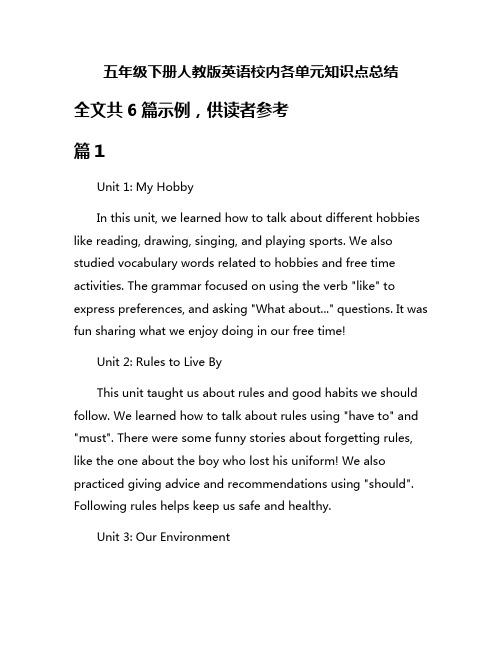
五年级下册人教版英语校内各单元知识点总结全文共6篇示例,供读者参考篇1Unit 1: My HobbyIn this unit, we learned how to talk about different hobbies like reading, drawing, singing, and playing sports. We also studied vocabulary words related to hobbies and free time activities. The grammar focused on using the verb "like" to express preferences, and asking "What about..." questions. It was fun sharing what we enjoy doing in our free time!Unit 2: Rules to Live ByThis unit taught us about rules and good habits we should follow. We learned how to talk about rules using "have to" and "must". There were some funny stories about forgetting rules, like the one about the boy who lost his uniform! We also practiced giving advice and recommendations using "should". Following rules helps keep us safe and healthy.Unit 3: Our EnvironmentProtecting the environment was the main topic here. We studied vocabulary about nature, like names of plants, animals, and habitats. The grammar covered using modal verbs like "can", "may", and "must" to talk about environmental protection. We learned the importance of the 3 R's - reduce, reuse, and recycle! Taking care of our planet is so important.Unit 4: Going PlacesThis fun unit was all about transportation and travel. We learned names of different vehicles and how to ask "How do you go to...?" The grammar focused on using prepositions of motion and the present continuous tense for actions happening now. We did a survey about how classmates get to school. It made us think about transportation choices.Unit 5: Tell Me About ItThe fifth unit helped us describe experiences and past events using the simple past tense. We read stories about field trips, summer vacations, and special occasions like birthdays. The grammar also covered using "when" and time expressions like "ago" or "last year". Now we can share what we did before!Unit 6: Making PlansHere we learned how to make plans and talk about future arrangements. The grammar taught "be going to" for planned actions, and using "can" to make requests or ask for permission. We practiced dialogues for activities like going to the park or joining a sports team. It's useful for discussing what we want to do.Unit 7: It's a Good DealThis unit focused on shopping, money, and prices. We built our vocabulary with words for stores, numbers, clothing items, and more. Practicing dialogs helped us learn polite ways to ask about costs or make purchases. The grammar covered using demonstrative pronouns like "this" and "that". Now we can go shopping easily!Unit 8: All Kinds of WeatherIn the last unit, we explored different types of weather. We read fun poems and did activities to learn weather words like "sunny", "rainy", and "windy". The grammar showed how to talk about the weather using "It's..." sentences. We even made our own meteorologist reports to describe the forecast! Understanding weather helps us dress properly.I hope these summaries are helpful for reviewing what you learned in each unit. Just let me know if you need any clarification or have additional questions!篇2五年级下册人教版英语校内各单元知识点总结Unit 1: My School LifeIn this unit, we learned about our school life and daily routines. We also learned how to express our likes and dislikes. Here are some key points:Words and phrases: subjects, timetable, break time, lunchtime, playground, library, classroom, favorite, like, dislike, etc.Sentences: "I have English on Monday", "I like playing football", "I dislike studying Chinese", etc.Unit 2: My FamilyThis unit was all about our families and relationships. We learned how to describe our family members and talk about their occupations. Here are some important points:Words and phrases: father, mother, sister, brother, grandparents, uncle, aunt, cousin, doctor, teacher, engineer, etc.Sentences: "My mother is a doctor", "I have one brother and one sister", "My cousin is a teacher", etc.Unit 3: Fun TimeIn this unit, we learned about different activities and hobbies that we enjoy during our free time. Here are the key points:Words and phrases: swimming, dancing, painting, playing chess, collecting stamps, listening to music, etc.Sentences: "I like swimming in the summer", "My hobby is painting", "I enjoy listening to music", etc.Unit 4: Our WorldUnit 4 introduced us to different countries, cultures, and languages around the world. Here are the important points:Words and phrases: country, capital, national flag, language, culture, traditional clothes, etc.Sentences: "The capital of China is Beijing", "The national flag of the United States has stars and stripes", "English is spoken in many countries", etc.Unit 5: Healthy HabitsThis unit focused on teaching us about healthy habits and the importance of taking care of our bodies. Here are the key points:Words and phrases: exercise, eat fruits and vegetables, brush teeth, wash hands, get enough sleep, etc.Sentences: "We should exercise regularly", "It's important to eat fruits and vegetables", "Remember to brush your teeth twice a day", etc.Unit 6: Let's CelebrateUnit 6 was all about different celebrations and festivals around the world. Here are the important points:Words and phrases: New Year's Day, Christmas, Halloween, Spring Festival, lantern, costume, gift, etc.Sentences: "People celebrate Christmas on December 25th", "During the Spring Festival, we give red envelopes", "Children wear costumes on Halloween", etc.Unit 7: Our EnvironmentIn this unit, we learned about the environment and the importance of protecting it. Here are the key points:Words and phrases: pollution, recycle, waste, energy, protect, plant trees, etc.Sentences: "We should recycle paper and plastic", "Don't waste water", "We need to protect our environment", etc.Unit 8: Looking BackUnit 8 was a review unit where we had the opportunity to revise and reinforce what we learned throughout the year. We reviewed vocabulary, grammar, and did various exercises.That's the summary of the key points from each unit in the fifth-grade English textbook. Remember to practice using these words and sentences in your daily life to improve your English skills. Keep up the good work, and I'm sure you'll become an excellent English speaker!篇3五年级下册人教版英语校内各单元知识点总结Unit 1: Fun with FriendsIn this unit, we learned how to talk about our friends and their hobbies. We practiced using possessive pronouns like "his" and "her" to describe what our friends have.Unit 2: Our School LifeIn this unit, we talked about our school life and the subjects we study. We learned new vocabulary related to school subjects and daily routines. We also learned how to use adjectives to describe our school and teachers.Unit 3: Outdoor FunIn this unit, we learned about different outdoor activities and how to express our preferences. We practiced using the comparative form of adjectives to compare things. We also learned about different weather conditions and how to talk about them.Unit 4: Our CommunityIn this unit, we talked about our community and the places we can visit. We learned new vocabulary related to community helpers and different locations. We practiced giving and following directions using prepositions like "in," "on," and "next to."Unit 5: Healthy HabitsIn this unit, we learned about the importance of healthy habits and how to describe them. We learned new vocabularyrelated to food, sports, and daily routines. We also practiced using imperatives to give instructions and suggestions.Unit 6: Amazing AnimalsIn this unit, we explored the animal kingdom and learned about different types of animals. We learned new vocabulary related to animals and their habitats. We also practiced using present continuous tense to describe what animals are doing.Unit 7: Festivals and CelebrationsIn this unit, we learned about different festivals and celebrations around the world. We learned new vocabulary related to festivals, traditions, and customs. We also practiced using past tense to talk about past events and celebrations.Unit 8: Protecting the EnvironmentIn this unit, we discussed the importance of protecting the environment and how we can contribute. We learned new vocabulary related to environmental issues and actions we can take. We also practiced using modal verbs like "can" and "should" to express abilities and suggestions.Unit 9: Fun TimeIn this unit, we talked about different leisure activities and how to express our preferences. We learned new vocabulary related to hobbies and free time. We also practiced using "I like" and "I don't like" to talk about our interests.Unit 10: Our WorldIn this unit, we learned about different countries and cultures around the world. We learned new vocabulary related to countries, nationalities, and landmarks. We also practiced using present tense to describe people and places.Remember to review the vocabulary and grammar we learned in each unit. Practicing speaking and listening will help you become more confident in using English. Keep up the good work and enjoy learning English!篇4Five Grade English Knowledge SummaryHello, everyone! Today, I'm going to share with you a summary of the knowledge points in the second semester of the fifth grade English textbook. Let's dive in and have some fun!Unit 1: Seasons and WeatherIn this unit, we learned about different seasons and weather conditions. We know that there are four seasons: spring, summer, autumn, and winter. Each season has its own unique characteristics. For example, spring is warm and flowers bloom everywhere, while winter is cold and it snows.We also learned how to talk about the weather. We use phrases like "It's sunny," "It's cloudy," "It's raining," and "It's snowing" to describe the weather conditions. It's important to pay attention to the weather forecast every day.Unit 2: Hobbies and ActivitiesIn this unit, we talked about our hobbies and activities. Hobbies are the things we like to do in our free time. Some popular hobbies include playing sports, reading books, drawing pictures, and singing songs. We also learned how to ask and answer questions about hobbies, such as "What's your favorite hobby?" and "Do you like playing basketball?"We also learned about different activities we can do, such as swimming, cycling, and playing musical instruments. It's important to have hobbies and activities that we enjoy because they make our lives more interesting and fun!Unit 3: My School DayIn this unit, we learned how to talk about our school day. We learned how to say the time using phrases like "quarter past," "half past," and "quarter to." For example, we say "It's half past seven" to mean 7:30.We also learned the names of different school subjects, such as English, math, science, and art. We talked about our favorite subjects and what we do in each class. It's important to have a good routine and manage our time well at school.Unit 4: Our WorldIn this unit, we explored different countries and cultures. We learned about famous landmarks around the world, such as the Great Wall of China, the Eiffel Tower, and the Statue of Liberty. We also learned about different festivals and celebrations in different countries, such as Chinese New Year and Thanksgiving.We discovered that our world is diverse and filled with interesting things to learn. It's important to respect and appreciate different cultures and traditions.Unit 5: Let's Celebrate!In this unit, we learned about different celebrations and how to express our wishes. We learned phrases like "Happy birthday,""Merry Christmas," and "Happy New Year." We also learned about different customs and traditions during celebrations.We had a lot of fun making greeting cards and decorations for various celebrations. It's important to show our love and care for others during special occasions.Unit 6: Healthy LivingIn this unit, we talked about ways to stay healthy. We learned about the importance of eating a balanced diet, exercising regularly, and getting enough sleep. We also learned about personal hygiene, such as washing hands before meals and brushing teeth twice a day.We had fun learning about healthy food and making healthy snacks. It's important to take care of our bodies and make healthy choices every day.That's all for the summary of the knowledge points in the second semester of the fifth grade English textbook. I hope you enjoyed it and found it helpful. Keep practicing and have a great time learning English!篇5五年级下册人教版英语校内各单元知识点总结嗨!大家好!我是小明,今天我要和大家分享一下五年级下册人教版英语的知识点总结。
(完整版)人教版五年级英语下册Unit1知识点汇总

Unit1 My day 知识整理△话题:谈论每天的活动及时间安排△词汇:do morning exercises(做早操)eat breakfast/lunch/dinner(吃早餐/午餐/晚餐)have...class(上…课),play sports(做运动)clean my room(打扫我的房间),go for a walk (散步) go shopping(购物),take a dancing class(上舞蹈课)△拓展词汇:get up(起床), go to bed(上床睡觉)wash my clothes(洗我的衣服), watch TV(看电视)do homework(做作业), play music(演奏音乐)cook dinner(煮晚餐), at home(在家)in the morning(在上午),in the afternoon(在下午)in the evening(在晚上),at night(在半夜)△句型:①询问做某事在几点When do you+动词原形(短语)+其他?—— At +时间—— I(+频度副词)+动词原形(短语)+at+时间。
例句:When do you get up in the morning?—— At 7:30.—— I often get up at 7:30.②询问周末的活动安排What do you often do on the weekend?I often (always/sometime/usually) +…(周末的活动)+with … (某人)+on the weekend (on Saturdays/on Sundays ).例句:What do you do on the weekend ?I often take a dancing class with my friend on Sundays. △知识点:1:注意介词的搭配at +具体时间(几点)/night/home at 9 o ’clock in +国家/季节 in Spainon +星期 on the weekend/on Sundays with +人 with my father/mother/friend 2:表示时间频率词的区别always 表示总是,一直;usually 表示经常,通常;often 表示经常,常常;sometimes 表示有时,间或。
完整版)人教版五年级下册英语知识点整理
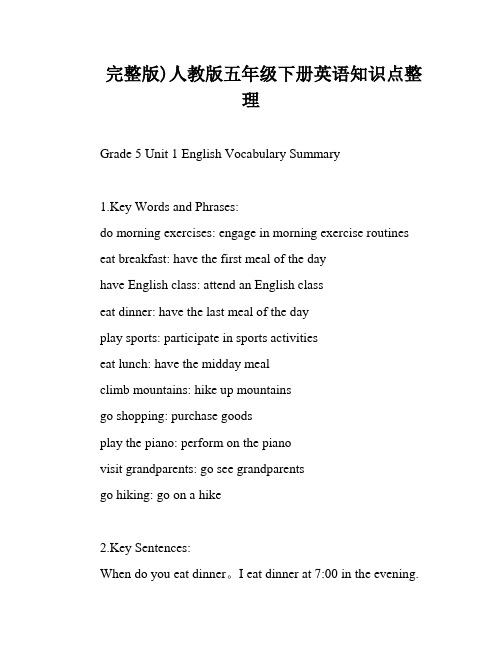
完整版)人教版五年级下册英语知识点整理Grade 5 Unit 1 English Vocabulary Summary1.Key Words and Phrases:do morning exercises: engage in morning exercise routines eat breakfast: have the first meal of the dayhave English class: attend an English classeat dinner: have the last meal of the dayplay sports: participate in sports activitieseat lunch: have the midday mealclimb mountains: hike up mountainsgo shopping: purchase goodsplay the piano: perform on the pianovisit grandparents: go see grandparentsgo hiking: go on a hike2.Key Sentences:When do you eat dinner。
I eat dinner at 7:00 in the evening.When do you get up。
I usually get up at 12:00 at noon.What do you do on the weekend。
Usually。
I watch TV and go shopping。
Sometimes。
I go hiking.I often play football.3.Important Points:Synonyms: eat breakfast - have breakfast。
eat lunch - have lunch。
人教版英语五年级下册知识点1-3单元
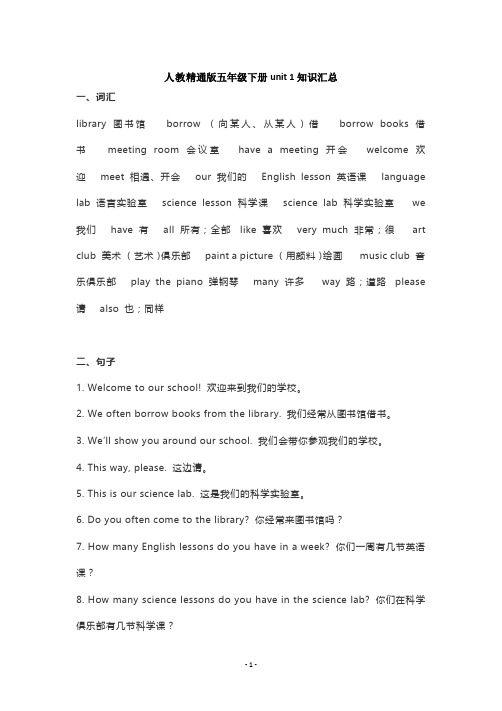
人教精通版五年级下册unit 1 知识汇总一、词汇library 图书馆 borrow (向某人、从某人)借 borrow books 借书 meeting room 会议室have a meeting 开会welcome 欢迎meet 相遇、开会our 我们的English lesson 英语课language lab 语言实验室science lesson 科学课science lab 科学实验室 we 我们have 有all 所有;全部 like 喜欢very much 非常;很 art club 美术(艺术)俱乐部paint a picture (用颜料)绘画 music club 音乐俱乐部play the piano 弹钢琴many 许多 way 路;道路 please 请also 也;同样二、句子1. Welcome to our school! 欢迎来到我们的学校。
2. We often borrow books from the library. 我们经常从图书馆借书。
3. We’ll show you around our school. 我们会带你参观我们的学校。
4. This way, please. 这边请。
5. This is our science lab. 这是我们的科学实验室。
6. Do you often come to the library? 你经常来图书馆吗?7. How many English lessons do you have in a week? 你们一周有几节英语课?8. How many science lessons do you have in the science lab? 你们在科学俱乐部有几节科学课?9. We have one science lesson in the science lab.我们在科学俱乐部有一节科学课。
新人教版PEP 【小学五年级英语下册】 单元知识点 归纳总结

新人教版PEP 【小学五年级英语下册】单元知识点归纳总结Unit 1 My DayIn this unit。
we learn some core vocabulary words。
phrases。
and XXX.Core Vocabulary:1.Verbs: take (studying)。
go to (class)2.Nouns: dancing。
exercise。
sports3.Phrases: do morning exercises。
eat breakfast。
play sports。
eat dinner。
go for a walk。
go shopping。
clean my room。
take a dancing class。
have a classXXX Vocabulary:1.Verbs: start。
shop。
work。
need。
live。
win。
sound2.Nouns: Spain。
play。
letter。
island。
cave3.ns: after4.XXX: when。
XXX。
a.m。
p.m。
why。
last。
also。
busy5.nal Vocabulary: frequency adverbs (always。
usually。
sometimes)Phrases:watch TV。
eat lunch。
go to bed。
go swimming。
go home。
go to schoolCore Sentence Structure:When do you do morning exercises?" "At 7 o'clock."XXX phrase is "good job" to praise XXX.Which season do you like best。
I like winter best。
This sentence means "which one do you like the most" and "like。
PEP人教版小学英语五年级下册单元知识梳理总结(全套)

Unit 1知识梳理【重点单词】1.exercise 活动;运动2.take 学习;上(课)3.dancing 跳舞;舞蹈4.when 什么时候;何时5.after 在(时间)后6.start 开始ually 通常地;惯常地te 晚;迟9.a.m. 午前;上午10.p.m. 午后;下午11.why 为什么12.busy 忙的13.always 总是;一直【重点词组】1.eat breakfast 吃早饭2.have … class 上……课3.play sports 进行体育运动4.do morning exercises 做早操5.eat dinner 吃晚饭6.clean my room 打扫我的房间7.go for a walk 散步8.go shopping 去买东西;购物9.take a dancing class 上舞蹈课【重点句子】1.I get up at 5 o’clock.我五点钟起床。
2.That sounds like a lot of fun.听起来很有趣。
3.I usually wash my clothes.我通常洗我的衣服。
4.Sometimes I cook dinner.有时候我做晚饭。
5.I often go shopping.我经常去购物。
【重点对话】1.—When do you finish class in the morning? 你们上午的课到几点结束? —We finish class at 1 o’clock.我们一点钟结束上午的课。
2.—When do you eat dinner? 你几点钟吃晚饭?—At 6:00 p.m.下午六点钟。
3.—What do you do on the weekend ? 你周末做什么?—I often watch TV and play ping-pong with my father.我经常看电视,也常和我爸爸一起打乒乓球。
人教版PEP英语五年级下册Unit1-My-Day知识点归纳与练习(含答案)
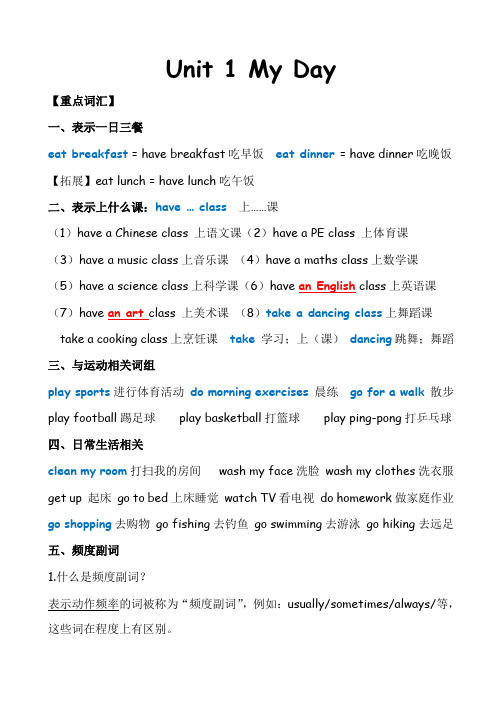
Unit 1 My Day【重点词汇】一、表示一日三餐eat breakfast = have breakfast吃早饭eat dinner= have dinner吃晚饭【拓展】eat lunch = have lunch吃午饭二、表示上什么课:have … class 上……课(1)have a Chinese class 上语文课(2)have a PE class 上体育课(3)have a music class上音乐课(4)have a maths class上数学课(5)have a science class上科学课(6)have an English class上英语课(7)have an art class 上美术课(8)take a dancing class上舞蹈课take a cooking class上烹饪课take学习;上(课)dancing跳舞;舞蹈三、与运动相关词组play sports进行体育活动do morning exercises晨练go for a walk散步play football踢足球play basketball打篮球play ping-pong打乒乓球四、日常生活相关clean my room打扫我的房间wash my face洗脸wash my clothes洗衣服get up 起床go to bed上床睡觉watch TV看电视do homework做家庭作业go shopping去购物go fishing去钓鱼go swimming去游泳go hiking去远足五、频度副词1.什么是频度副词?表示动作频率的词被称为“频度副词”,例如:usually/sometimes/always/等,这些词在程度上有区别。
2.常见频度副词按频率大小排列如下:always(100%)>usually(80%)>often(60%)>sometimes(20%~40%)> never (0%)3.注意频度副词的使用位置:①We usually go to school at seven in the morning.②What do you often do on the weekend?六、常见时间的表达方式1.at + 具体的几点钟;at noon在中午;at night在晚上2.in +月份/季节/早中晚例如:in the morning/afternoon/evening3.关于on表示时间的几种情况:①on + 星期几;②on + 几月几日;③on the weekend在周末;④on Monday morning星期一早上。
人教版PEP小学英语五年级下册知识点汇总(最新)
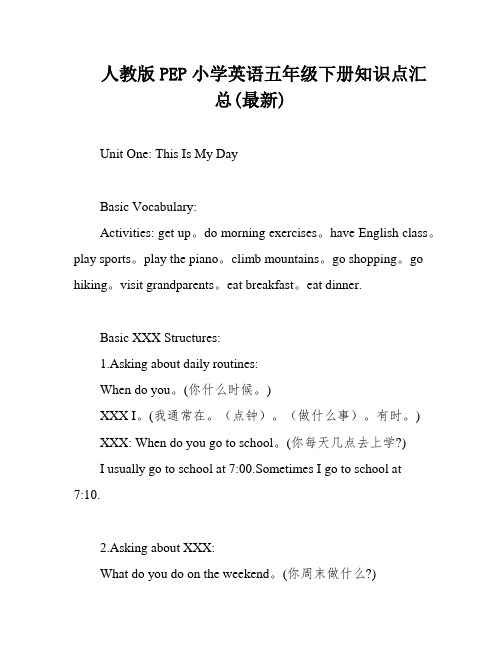
人教版PEP小学英语五年级下册知识点汇总(最新)Unit One: This Is My DayBasic Vocabulary:Activities: get up。
do morning exercises。
have English class。
play sports。
play the piano。
climb mountains。
go shopping。
go hiking。
visit grandparents。
eat breakfast。
eat dinner.Basic XXX Structures:1.Asking about daily routines:When do you。
(你什么时候。
)XXX I。
(我通常在。
(点钟)。
(做什么事)。
有时。
)XXX: When do you go to school。
(你每天几点去上学?)I usually go to school at 7:00.Sometimes I go to school at7:10.2.Asking about XXX:What do you do on the weekend。
(你周末做什么?)XXX I。
(我通常/经常。
有时。
)XXX: What do you do on the weekend?I often play XXX I go shopping with my mom.3.Introducing one's own habits:Every weekend。
I go hiking。
(我每个周末远足。
)Every day。
I do my homework at 8:00 in the evening。
(我每天晚上8点做作业。
)4.Asking XXX:What do you do。
(你是干什么的?)Time:morning。
afternoon。
evening。
noon。
at night。
6:00.on Sunday。
(完整版)人教版PEP五年级下册英语知识点复习总结
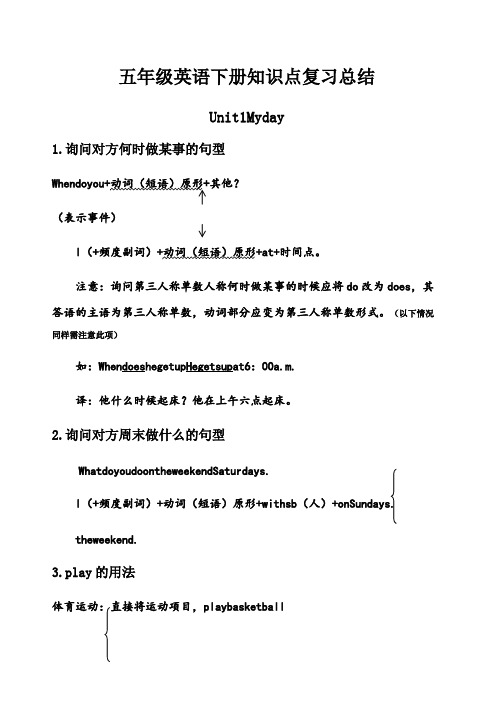
五年级英语下册知识点复习总结
Unit1Myday
1.询问对方何时做某事的句型
Whendoyou+动词(短语)原形+其他? (表示事件)
I(+频度副词)+动词(短语)原形+at+时间点。 注意:询问第三人称单数人称何时做某事的时候应将 do 改为 does,其 答语的主语为第三人称单数,动词部分应变为第三人称单数形式。(以下情况
同样需注意此项)
如:WhendoeshegetupHegetsupat6:00a.m. 译:他什么时候起床?他在上午六点起床。
2.询问对方周末做什么的句型
WhatdoyoudoontheweekendSaturdays. I(+频度副词)+动词(短语)原形+withsb(人)+onSundays. theweekend.
(2)在基数词后加 th:除去 first,second,third,其他基数词变序数词一般 直接在其后加 th。注意 five 与 twelve 要先把 ve 变 f,再加 th;eight 直接加 h;nine 去 e 再加 th。
(3)整十序数词以 ieth 结尾:整十位的序数词先将十位整数词尾的 y 变为 i, 再加 eth。如:twenty-twentieth。
The
注意:play-plays 因为 a 是元音 3)以 ch,sh,s,x 或 o 结尾的动词,在后面加-es; 例如 teach-teacheswash-washesdo-doesgo-goesfix-fixes
4)不规则的; 例如 have-has
5.by 的用法
新人教版五年级下册英语知识点汇总

五年级下册英语第一单元知识点整理1、主要单词和短语:do morning exercises 晨练,做早操eat breakfast 吃早饭have En glish class 上英语课eat dinner 吃晚饭play sports 进行体育活动eat lunch 吃午饭climb mountains 爬山go shopp ing 购物,买东西play the pia no 弹钢琴visit gran dpare nts 看望(外)祖父母go hiki ng 去远足二、主要句子:Whe n do you eat dinner? 你什么时候吃晚饭? 1 eat dinn er at 7:00 in the evening我晚上七点吃晚饭。
Whe n do you get up? 你什么时候起床?I usually get up at 12:00 at noon. 我通常在中午12点起床。
What do you do on the weeke nd? 你在周末干什么?Usually I watch TV and go shopp ing. 我通常看电视和购物。
I ofte n play football. 我经常踢足球。
Sometimes I go hiki ng. 有时候我去远足。
三、重要知识点同义词:eat breakfast-havebreakfast , eat lun ch-have lun ch, eat dinn er-have dinner play sports-do sports, usually-ofte n复数形式:policema n-policeme n policewoma n-policewome n现在分词:tell-telli ng第三人称单数:say-says同义句:What do you do ? ---What are you? 你是干什么的?表示频度的副词:always总是,一直;usually通常,常常;often 经常; sometimes有时候以复数形式出现的词组:visit gran dpare nts ,pla nt trees介词后跟表示时间的词语时,表示在某年、某月]、某个季节,某个时候(在上午,在下午,在晚上)用in;表示在某天,在星期几用on,在具体的几点几分用at.too和either的用法区别:too和either都是也的意思,但too用于肯定句,either用于否定句。
人教版PEP五年级英语下册各单元语法点

人教版PEP五年级英语下册各单元语法点Unit 1: What Does She Do?- 一般现在时:用于描述日常活动或惯。
主语为第三人称单数时,动词加-s或-es。
- 观察寻找规律:第三人称单数的动词加-s或-es。
- Be动词+动词-ing:用于描述正在进行的动作。
主语为第三人称单数时,be动词用is。
- 一般现在时的否定句:在动词前面加don't/doesn't。
- 一般现在时的疑问句:将do/does置于主语之前。
Unit 2: Can You Run?- Can的用法:用于表示能力和询问对方是否能够做某事。
- Can的否定形式:在can后面加not或缩略形式can't。
- Can的疑问形式:将can置于句首。
Unit 3: What Are They Doing?- 现在进行时:用于描述正在进行的动作。
动词加-ing。
- 现在进行时的否定句:在be动词后面加not。
- 现在进行时的疑问句:将be动词置于句首。
Unit 4: I'm Sitting at the Front.- 介词短语表示地点:用于描述人或物所在的位置。
- 介词on、in、under、behind、in front of、next to等的用法。
Unit 5: What Are You Going to Do?- be going to的用法:表示将来要做的事情。
- be going to的否定形式:在be动词后面加not。
- be going to的疑问形式:将be动词置于句首。
Unit 6: It's Raining!- 祈使句:用于表示请求、命令或建议。
动词原形作谓语。
- 祈使句的否定形式:在动词前面加don't。
- 祈使句的疑问形式:用Do开头。
Unit 7: How Often Do You Exercise?- 表示频率的副词:用于描述动作发生的频率。
- always, usually, often, sometimes, hardly ever, never等的用法。
人教版五年级英语下册全册知识点总结
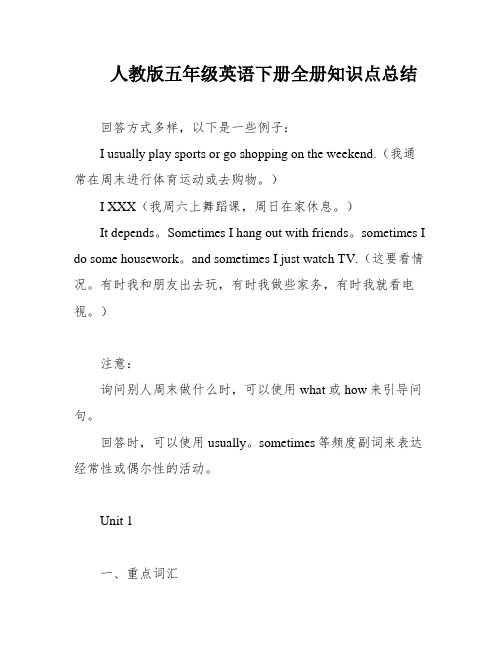
人教版五年级英语下册全册知识点总结回答方式多样,以下是一些例子:I usually play sports or go shopping on the weekend.(我通常在周末进行体育运动或去购物。
)I XXX(我周六上舞蹈课,周日在家休息。
)It depends。
Sometimes I hang out with friends。
sometimes I do some housework。
and sometimes I just watch TV.(这要看情况。
有时我和朋友出去玩,有时我做些家务,有时我就看电视。
)注意:询问别人周末做什么时,可以使用what或how来引导问句。
回答时,可以使用usually。
sometimes等频度副词来表达经常性或偶尔性的活动。
Unit 1一、重点词汇吃早餐:eat breakfast 上······课:have。
class进行体育运动:play sports做早操:do morning exercises 打扫我的房间:clean my room 去购物:go shopping舞蹈:dancing上午:a.m.通常地:usually二、其他日常活动起床:get up上床睡觉:go to bed活动,运动:exercise吃晚饭:eat XXX散步:go for a walk研究,上(课):XXX上舞蹈课:take a dancing class下午:p.m.吃午饭:eat XXX洗脸:XXX洗我的衣服:XXX看电视:watch TV打乒乓球:play ping-pong弹琵琶:play the pipa去游泳:go swimming去跑步:go running做作业:do homework练武术:do XXX踢足球:play football打篮球:play basketball三、语音cl→ [cl]:clean。
人教版五年级英语下册各单元知识点复习ppt课件

=my picture
.
5
这些都是我们的吗? Are these all ours?
询问某件/些物品是谁的: 单数:Whose +(名词)+ is this / that / it ? 这是谁的?Whose is this? 这只狗是谁的?Whose dog is this? It’s mine / yours / hers / his / Mike’s / Zhang Peng’s/ Amy’s.
When is Children’s Day ? 4.She is cleaning her room. (就划线部分提问)
What is she doing ? 5.I often read books in the evening. (就划线部分
提问)
What do you often do in. the evening?
1st__f_ir_s_t __ 2nd__s_e_c_o_n_d 3rd____th_ir_d_ 4th ___f_o_u_rt_h_ 5th __f_if_th___ 8th ___e_ig_h_th__9th ___n_i_n_th_ 12th __t_w_e_lf_th_ 20th t_w_e_n_ti_e_th_
.
7
Unit 6 Work quietly !
询问某人在做什么: 单数:What is he / she / it/ Mike doing? He / She / It / Mike is + 现在分词 那只小猴子在干什么? What is the little monkey doing? 它在和妈妈玩耍。 It’s playing with its mother. 复数:What are they / the students / doing? They are +现在分词
人教版英语五年级下册知识点总结

人教版英语五年级下册知识点总结一、词汇核心词汇学校生活:classroom, library, playground, office, restroom, schedule, lesson, homework, break, lunch家庭成员:family, father, mother, brother, sister, uncle, aunt, cousin日常活动:get up, go to bed, wash face, brush teeth, eat breakfast, do homework, watch TV, play computer games 食物与饮料:hamburger, hot dog, sandwich, pizza, cake, cookie, milk, juice, water拓展词汇学科名称:math, science, Chinese, English, PE, art, music 颜色与衣物:red, blue, yellow, green, white, black, shirt, pants, shoes, hat, socks动物与植物:cat, dog, fish, bird, rabbit, flower, tree, grass, leaf节假日与活动:birthday, Christmas, Spring Festival, summer vacation, winter vacation, party, picnic二、语法现在进行时表达正在进行的动作或状态。
be动词(am/is/are)+动词-ing形式。
例句:What are you doing? I am reading a book. They are playing football.一般现在时表达经常性的行为或状态。
主语为第三人称单数时,动词形式要发生改变。
例句:She always washes her hands before meals. He often watches TV in the evening.一般过去时表达过去某个时间发生的动作或状态。
(完整版)人教版小学PEP英语五年级下册知识点归纳

人教版小学PEP英语五年级下册知识点归纳PEP五年级英语下册各单元知识点Unit 1 My day一、重点词汇。
1.四会词汇:eat breakfast 吃早饭 have···class 上······课play sports 进行体育运动exercise 活动;运动 domorning exercises做早操eat dinner吃晚饭clean my room 打扫我的房间go shopping 去买东西;购物go for a walk 散步take学习;上(课) dancing跳舞;舞蹈 take a dancing class 上舞蹈课2. 三会词汇:when什么时候after 在(时间)后start 开始usually 通常地;惯常地Spain 西班牙late 晚;迟 a.m. 午前;上午 p.m. 午后;下午why 为什么shop 去买东西;购物work 工作last 上一个的;刚过去的sound 听起来好像also 还;也busy 忙的 need 需要play 戏剧;剧本letter 信live 居住island 岛always 总是;一直cave 山洞;洞穴go swimming 去游泳 win 获胜二、其他日常活动。
get up起床 eat lunch吃午饭 go to bed 上床睡觉wash my face洗脸 wash my clothes 洗我的衣服 watch TV看电视play ping-pong打乒乓球 playthe pipa弹琵琶 go swimming去游泳go running去跑步 do homework 做作业 do kung fu练武术play football踢足球 play basketball打篮球三、频度副词。
always总是,一直(100%) usually通常(80%)often 经常(60%) sometimes(30%)有时四、疑问词。
新人教版五年级下册英语知识点汇总
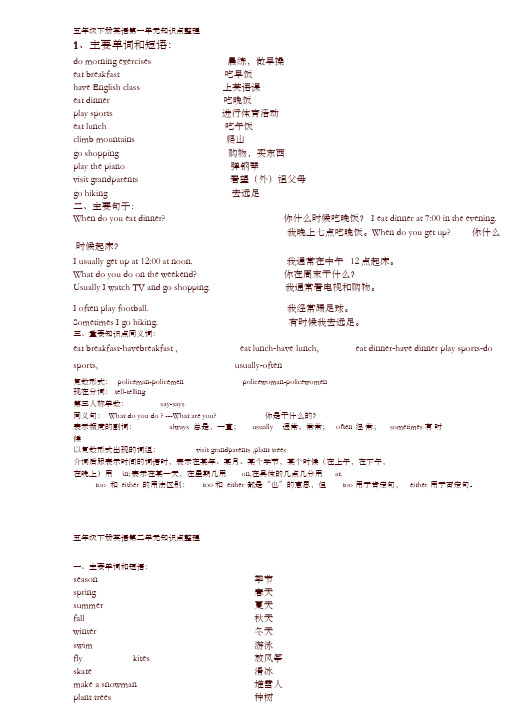
五年级下册英语第一单元知识点整理1、主要单词和短语:do morning exercises 晨练,做早操eat breakfast 吃早饭have English class 上英语课eat dinner 吃晚饭play sports 进行体育活动eat lunch 吃午饭climb mountains 爬山go shopping 购物,买东西play the piano 弹钢琴visit grandparents 看望(外)祖父母go hiking 去远足二、主要句子:When do you eat dinner? 你什么时候吃晚饭? I eat dinner at 7:00 in the evening.我晚上七点吃晚饭。
When do you get up? 你什么时候起床?I usually get up at 12:00 at noon. 我通常在中午12 点起床。
What do you do on the weekend? 你在周末干什么?Usually I watch TV and go shopping. 我通常看电视和购物。
I often play football. 我经常踢足球。
Sometimes I go hiking. 有时候我去远足。
三、重要知识点同义词:eat breakfast-havebreakfast , eat lunch-have lunch, eat dinner-have dinner play sports-do sports, usually-often复数形式: policeman-policemen policewoman-policewomen现在分词: tell-telling第三人称单数:say-says同义句: What do you do ? ---What are you? 你是干什么的?表示频度的副词:always 总是,一直;usually 通常,常常;often 经常;sometimes 有时候以复数形式出现的词组:visit grandparents ,plant trees介词后跟表示时间的词语时,表示在某年、某月、某个季节,某个时候(在上午,在下午,在晚上)用in; 表示在某一天,在星期几用on,在具体的几点几分用at.too 和either 的用法区别:too 和 either 都是“也”的意思,但too 用于肯定句,either 用于否定句。
人教版五年级下册英语知识点整理新编

五年级下册英语第一单元知识点整理1、主要单词和短语:do morning exercises 晨练,做早操eat breakfast 吃早饭have English class 上英语课eat dinner 吃晚饭play sports 进行体育活动eat lunch 吃午饭climb mountains 爬山go shopping 购物,买东西play the piano 弹钢琴visit grandparents 看望(外)祖父母go hiking 去远足二、主要句子:When do you eat dinner? 你什么时候吃晚饭?I eat dinner at 7:00 in the evening. 我晚上七点吃晚饭。
When do you get up? 你什么时候起床?I usually get up at 12:00 at noon. 我通常在中午12点起床。
What do you do on the weekend? 你在周末干什么?Usually I watch TV and go shopping. 我通常看电视和购物。
I often play football. 我经常踢足球。
Sometimes I go hiking. 有时候我去远足。
三、重要知识点同义词:eat breakfast-have breakfast , eat lunch-have lunch, eat dinner-have dinner play sports-do sports, usually-often复数形式:policeman-policemen policewoman-policewomen现在分词:tell-telling第三人称单数:say-says同义句:What do you do ? ---What are you? 你是干什么的?表示频度的副词:always 总是,一直;usually 通常,常常;often 经常;sometimes 有时候以复数形式出现的词组:visit grandparents ,plant trees介词后跟表示时间的词语时,表示在某年、某月、某个季节,某个时候(在上午,在下午,在晚上)用in;表示在某一天,在星期几用on,在具体的几点几分用at.too 和either的用法区别:too和either都是“也”的意思,但too用于肯定句,either用于否定句。
- 1、下载文档前请自行甄别文档内容的完整性,平台不提供额外的编辑、内容补充、找答案等附加服务。
- 2、"仅部分预览"的文档,不可在线预览部分如存在完整性等问题,可反馈申请退款(可完整预览的文档不适用该条件!)。
- 3、如文档侵犯您的权益,请联系客服反馈,我们会尽快为您处理(人工客服工作时间:9:00-18:30)。
人教版五年级英语下册各单元知识点总结Unit 1 My day一、重点单词:do morning exercises做早操play sports做体育运动go for a walk去散步wash my clothes洗衣服eat breakfast吃早餐eat dinner吃晚餐go shopping去购物have…class上……课clean my room打扫我的房间take a dancing class 上舞蹈课start 开始finish完成always总是usually通常地often经常sometimes有时候二、语音:cl /kl/ clean clock class clever pl /pl/ plate eggplant please play三、重点句子:1. —When do you finish class in the morning? 你们上午的课几点钟结束?—We finish class at 1 o’clock. .我们一点钟结束上午的课。
2. —What do you do on the weekend? 你周末干什么?—I often watch TV and play ping-pong with my father. 我经常看电视,也常和我爸爸一起打乒乓球。
3. Here is a letter from him. 这是一封来自他的信。
(him 是写信人)Here is a letter to him. 这是一封给他的信。
(him是收信人)I write a letter to Robin. 我给Robin写了一封信。
4. I live on an island. (我居住在一个岛上面。
)5. Friday is good at sports. (星期五擅长做运动。
)Unit 2 My favourite season一、重点单词:spring春天summer夏天autumn秋天winter冬天go on a picnic去野餐go swimming去游泳pick apples摘苹果make a snowman堆雪人why为什么because因为which哪一个vacation假期二、语音:br /br/ brown library brother umbrella gr /gr/ green grapes grandpa grow三、重点句子:1.-Which season do you like best, Mike?=What’s your favourite season?你最喜欢哪一个季节?- Winter.(I like winter best.)我最喜欢冬天。
2.-Why?(Why do you like summer?)为什么?(为什么你喜欢夏天?)-Because I like summer vacation.(因为我喜欢暑假。
)3. I like spring because there are beautiful flowers everywhere.(后接句子)我喜欢春天,因为到处都有美丽的花朵。
I like summer best because of Children’s Day.(后接短语)因为儿童节,我喜欢夏天。
4. I like summer, but I can’t swim. 我喜欢夏天,但我不会游泳。
(转折)I like summer, and I can swim. 我喜欢夏天,我会游泳。
5. What lovely colours! 多么好看的颜色啊!6. I want to paint a picture, too. 我还想要画一张图画。
7. There is lots of snow. 有很多雪。
8. I like winter because I can play in the snow.(在雪地里玩)I like winter because I can play with snow.(玩雪)9. Spring is green with flowers and songs.Summer is hot and the days are long.Autumn is golden and farmers are busy.Winter is white and the year is gone.Unit 3 My school calendar一、重点单词:January一月February二月March三月April四月May五月June六月July七月August八月September九月October十月November十一月December 十二月the Great Wall长城school trip学校旅行party 聚会二、常用节假日名称。
New Year’s Day元旦Tree Planting Day 植树节Easter 复活节April Fool’s Day愚人节May Day 劳动节Mother’s Day 母亲节Children’s Day 儿童节Father’s Day父亲节Teachers’ Day教师节National Day国庆节Mid-Autumn Day 中秋节Thanksgiving Day 感恩节Christmas圣诞节summer vacation暑假winter vacation寒假三、介词in 、on、at的用法。
1、in的用法。
in后面+上午/下午/晚上/月份/季节/年份。
如:in the morning, in April, in winter, in 2015.2、on的用法。
on的后面+具体的某一天。
如:on Monday , on April 3rd, on Friday morning.3、at的用法。
at后面+具体的时间点或与其他词构成固定搭配。
如:at six o’clock, at 12:30,at noon。
四、语音:ch / tʃ / China chicken lunch teacher sh /ʃ/ sheep fish shirt shorts五、重点句子:1.- When is the party? 派对在什么时候?- It’s in April. 在四月份。
2.- When is the trip this year? 今年的秋游在什么时候?- It’s in October. We’ll go to the Great Wall.在十月份,我们将去长城。
3. We have a few fun things in spring.4. - Is the singing contest in May?歌唱比赛在五月份吗?- Yes.是的。
5.We will play many games. We will roll Easter eggs. We will look for eggs. We will eat chocolate eggs. Will you come to the party? Please send me an email at************************rd.6. My mum will make zongzi.我妈妈将制作粽子。
7. What will you do for your mum. 你将为你的妈妈做点什么? for 为,给Unit 4 When is Easter?一、重点单词:first(1st)第一second(2nd)第二third(3rd)第三fourth(4th)第四fifth(5th)第五twelfth(12th)第十二twentieth(20th)第二十twenty-first(21st)第二十一twenty-third(23rd)第二十三thirtieth(30th)第三十二、语音:th /θ/ three thin thirteen maths th /ð/ this that mother brother三、重点句子:1.- When is April Fool’s Day?愚人节在什么时候?-It’s on April 1st.在四月一日。
2.- When is your birthday?你的什么在什么时候?- My birthday is on April 4th.我的生日在四月一日。
3. - When is Mother’s Day?母亲节在什么时候?- It’s on the second Sunday is May. 在五月的第二个星期。
4. They are pink because they are very young.They make noise when they are hungry.5. There are some special days in April.6. We can have a birthday party for both of you.Unit 5 Whose dog is it?一、重点单词:mine我的yours 你的,(你们的)his他的hers她的theirs他们的,她们的ours 我们的climbing(正在)攀爬eating(正在)吃playing(正在)玩jumping(正在)跳drinking(正在)喝sleeping (正在)睡觉二、语音:ng /ŋ/ long sing ring young nk /ŋk/ think ink trunk pink三、重点句子:1.The yellow picture is mine.黄色的那副图片是我的。
2.- Are these all ours?这些都是我们的吗?-Yes, they are.是的3. -Is he drinking water?他正在喝水吗?-No, he isn’t. He’s eating.不,他正在吃。
4.-Whose dog is it?这只狗是谁的?-It’s Zhang Peng’s. 是张鹏的。
5. -What are you doing? 你在干什么?- I’m looking at a bear. 我正在看熊。
6. I’m dancing like a bear. 我正在像熊一样跳舞。
7. I like flying. I want to be a bird.我喜欢飞,我想要成为一只鸟。
8.- Do you want to swim like a fish?你想像鱼一样游泳吗?- No, I don’t want to be a fish. 不,我不想成为一条鱼。
